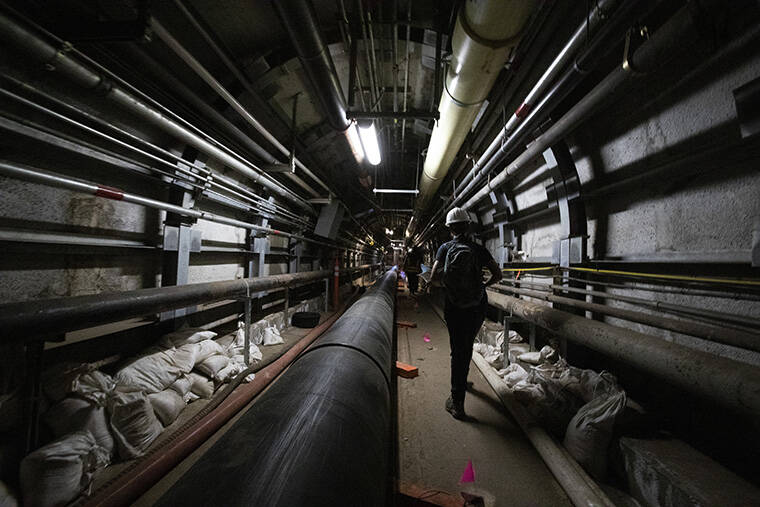Military families sue federal government over Red Hill fuel leak

CINDY ELLEN RUSSELL / JAN. 28
The U.S. Navy leads a media tour of the Red Hill Shaft in Halawa on Friday, Jan. 28.

COURTESY JUST WELL LAW
The Simic family is among the plaintiffs in a case against the federal government that seeks compensation for physical and mental suffering, medical expenses, lost income and other costs associated with the Red Hill fuel leak.


Military families who say they were sickened by last year’s fuel contamination of the Navy’s drinking water system around Joint Base Pearl Harbor-Hickam are suing the federal government, seeking compensation for physical and mental suffering, medical expenses, lost income and other costs associated with the Red Hill disaster.
The lawsuit was filed in federal court today on behalf of four families who are being represented by Kristina Baehr, an attorney with Just Well Law, based in Austin, Texas, and Honolulu attorney Lyle Hosoda. Additional plaintiffs are expected to be added to the lawsuit as a six month, mandatory waiting period that requires families to first seek administrative relief, expires. Baehr has said that her law firm represents about 150 affected families.
The plaintiffs only include the families of service members. Members of the military are barred from suing the federal government under the Federal Tort Claims Act.
The Navy in a statement Wednesday said it does not discuss details or provide status updates on specific claims.
“The Navy is focused on ensuring the safety and health of those impacted from the November 2021 fuel spill,” the Navy’s statement reads. “Nothing is more important than the health, safety, and well-being of our people, their families, and our community neighbors. Providing clean, safe, drinking water to our families and communities, and ensuring their continued health and safety concerns are addressed are our highest priorities.”
In November, hundreds of families on the Navy’s drinking water system began reporting fuel odors coming from their taps and said they were getting sick with nausea, vomiting, diarrhea, burning and itching skin and rashes. Navy and state health officials subsequently confirmed what many already suspected – that fuel from the Navy’s underground Red Hill fuel facility had contaminated the drinking water. The polluted drinking water well sits just 2,400 feet downgradient of the tanks that have a long history of leaks.
Don't miss out on what's happening!
Stay in touch with breaking news, as it happens, conveniently in your email inbox. It's FREE!
The families suing the federal government all say that in addition to the immediate health effects they suffered at the time of the contamination, they’ve continued to suffer numerous maladies.
Plaintiff Natasia Freeman lived with her husband, who is in the Navy, and three children at the Aliamanu Military Reservation. She had a preexisting seizure disorder, but it had been dormant prior to the water contamination, according to the lawsuit. She says she subsequently began having multiple seizures a day and has since suffered from a long list of other health problems, including blood in her urine, clarifications on her bladder wall and lesions on her brain.
Her children are also having health problems, according to the lawsuit, which says her children had abnormal lab results in August relating to their liver, kidney and pancreas.
The lawsuit alleges that the military provided inadequate medical care and providers refused to order basic blood screening to check for toxic exposure.
“Nastasia Freeman’s medical care has been riddled with mistake, delay, failure to diagnose, and failure to treat,” according to the lawsuit.
Jamie Simic, her husband and their children, who lived in the Hale Na Koa neighborhood are also suing. Jamie Simic says that she has had a long list of health problems as a result of exposure to the water. The lawsuit says that doctors have found multiple cysts, legions and tumors throughout her body since she fell ill, and her two children have suffered neurological symptoms and respiratory problems among other health effects.
The lawsuit cites a long list of failures by the military to protect the water supply, including its failure to address an earlier May 2021 fuel leak that ultimately led to the November contamination.
“The United States knew that the Red Hill facility has a history of fuel leak water contamination, and that it was probable that additional leaks would occur and cause substantial damage if it did not act,” according to the lawsuit. “The United States must now pay for the exact consequences that it knew would happen and for which it accepted the risk.”
Red Hill Lawsuit — Feindt v. USA by Honolulu Star-Advertiser on Scribd




